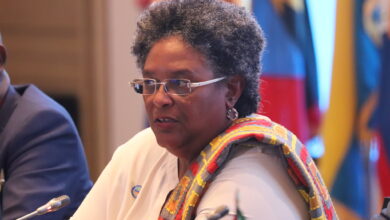Salutations
It is indeed a pleasure for me to welcome you to this National Training Workshop which focuses on Implementation of Prevention Strategies and Actions to address Youth Gangs and Violence and to bring you greetings and these brief remarks on behalf of the Secretary-General of the Caribbean Community, Ambassador Irwin LaRocque who regrets that he could not be here with us today. The Workshop is one of the follow-up activities identified under the CARICOM Youth Gangs and Violence: Partnering for Prevention and Social Development Project being piloted in Guyana and four other CARICOM Member States. You would have heard the details of this project from the Chairperson in her Opening Remarks.
In recent times, we have become acutely aware of the alarming escalation of violence in the entire Caribbean. The increasingly disturbing trend of the involvement of our youth as both victims and perpetrators of violent crimes must give us reason to pause and to search for answers which will hopefully guide us to solutions. In the Member States of our Community newspaper headlines scream this reality at us. The number of school age teenagers incarcerated for murder must be at an all time high.
In 2005, the Caribbean Commission on Health and Development flagged violence and injuries as one of the three issues with significant implications for development if not specifically addressed. Since then the prevalence of violence and injuries in CARICOM Member States has escalated such that it has become not only a public health problem, it has also become a priority regional security and development issue. Of specific concern are issues of organized crime and street gangs and small arms trafficking.
According to the UNDP 2012 Caribbean Human Development Report 2012, titled: Human Development and the Shift to Better Citizen Security:
‘Organized crime and gangs are the source of major lethal violence in the region. Youth are inherently vulnerable in the Caribbean development process. Youth violence is an important challenge, particularly in the form of street gangs, contributing to popular perceptions of increasing insecurity.
That Report goes on to highlight the following findings of their research with regard to the ‘Who and Why’ of Gangs in the Caribbean
Who?
‘We know little about the socio-demographic characteristics of street gang members in the Caribbean. Preliminary evidence on Jamaica and on Trinidad and Tobago indicates that, among school-aged youth, the majority of street gang members are male; however, female gang membership is also prevalent.’
‘This same body of research suggests that individuals join street gangs at a young age. In Trinidad and Tobago, school-aged youth who self-reported gang membership stated that, on average, they had first become involved with their gangs when they were 12 years old. Surveys of school officials in Antigua and Barbuda have indicated that most gang members are between the ages of 12 and 15 years. These preliminary findings together imply that the street gang problem is largely confined to young marginalized males. School-based gang prevention efforts should therefore begin early in life to inoculate youth from gang membership’.
Why?
‘There is almost no Caribbean-based empirical research examining why youth join street gangs. One of the few studies to examine the issue collected self-reported data from almost 2,300 school-aged youth in Trinidad and Tobago. The study found that most youth joined for reasons of friendship (42 percent) and protection or safety (29.4 percent). The remaining joined because a family member was in a gang (5.9 percent), to make money (8 percent), or for other reasons (14.7 percent).
.These statistics on crime and violence, and in particular data on youth crime and violence, indicate that the situation in the Caribbean is more that a perception, it is certainly a reality for many of the young people across the Region who indicated to CARICOM Commission on Youth Development in 2009, that crime and violence t was their ‘number one concern’.
How did we get to this current situation? The contributing factors are many and varied and not all well understood. For example, inadequate and poor parenting, the receding influence of institutions such as schools, faith and community based organizations which address many of the protective factors for young people, high levels of youth unemployment, exposure to and experience of violence at home, in school, in communities and the wider society, poor or inadequate educational opportunities, social exclusion’, are among the major determinants identified with violent youth gangs and crime.
The context for this meeting has been shaped, not only anecdotal reports but increasingly so, by research findings that highlight the serious development challenges posed by this situation and which challenge us to re- examining the paradigms within which we have viewed and treated with Crime and Security in our region.
In particular, the key message of the 2012 Human Development Report is that Caribbean countries need to focus on a model of security based on the human development approach, in which citizen security is paramount, rather than on the traditional state security model, in which the protection of the state is the chief aim. The Report emphasizes that the contrast between prevention and social development solutions on the one hand, and repression and coercion on the other, is ill conceived and encourages movement to a paradigm in which these aspects the Crime and Security response can reinforce and complement each other.
Ladies and gentlemen, that is why this wide cross section of organizations, individuals is assembled here today – law enforcement personnel, government, the private sector, civil society, – faith based and community based organizations, educators, youth, students, youth workers, development partners, the media. It is because we all have a stake in this and a role to play in ensuring that we reverse these disturbing trends. This is the third national engagement in Guyana and in particular, this workshop will focus on sensitization and capacity building for implementing programmes to address youth violence in schools and communities. The solutions to this scourge require partnerships that will outlast this project, which has a finite lifetime. It requires dedication to a cause one that we can only afford to neglect to our peril.
Sharing Good Practices and Forging Partnerships
One of the successes of this project has been the interchange and exchange of experiences among the pilot countries and internationally with the Regina Anti –Gang Services (RAGS) Saskatchewan, Canada. For example, the prevention intervention programme being undertaken in St. Kitts and Nevis through Operation Future (a collaborative effort between the Royal St. Kitts and Nevis Police Force, the Private Sector and Civil Society) was considered a ‘promising practice’ to be adapted for use in primary and secondary schools in the other countries. We have with us here today Mr Dan Mc Mullian and Corporal Percival Lawson of Operations Future, St Kitts and Nevis, who are here to share with us from their experiences as they facilitate some sessions. Similarly, Belize’s and RAGS experience in treating with persons wanting to exit gangs was also considered a promising practice to be modeled and in fact, representatives from Belize’s Conscious Youth Development Programme facilitated sessions with gang members at the St Kitts and Nevis national consultation‐training meeting. The sensitization and training materials prepared for, and developed during these workshops will be made available to all Member States. Indeed functional cooperation among the Member States of CARICOM and beyond, and the development of Regional Public goods have been important characteristics of this endeavour.
Last, but by no means least, I wish to express sincere appreciation to our Development partners who have demonstrated continuing keen interest and support for this and similar initiatives throughout the Region. This workshop is supported by the United Nations Development Programme (UNDP). Previous and other current initiatives in this project in Guyana and throughout the Region have been supported by UNDP, the Government of Canada, and by the US Agency for international Development (USAID). There is also continuing support for regional programmes that have similar objectives, for example the US Government Caribbean Basin Security initiative (CBSI). This regional Crime and Security Programme is also expected to receive a significant boost from resources that will become available under the European Development Fund, which has, in the recent past also facilitated substantive initiatives in this area.
To all of our partners attending this workshop, it is my hope that you will not only benefit from, and contribute to the capacity building exercises, but you will see more clearly your own role in addressing the aspect of youth development and continue to exert strong influence in your respective spheres. The CARICOM Secretariat looks forward to continuing this partnership with you as together we strive to ensure the development of citizens and our region.
I Thank you.





